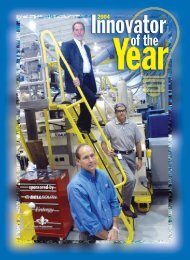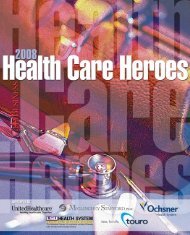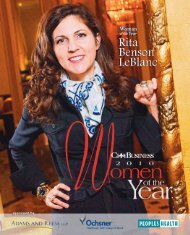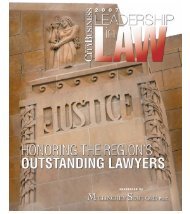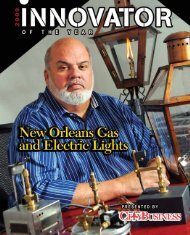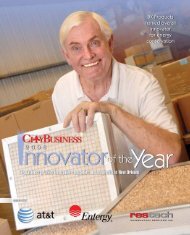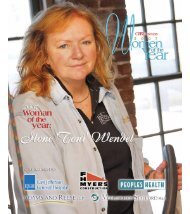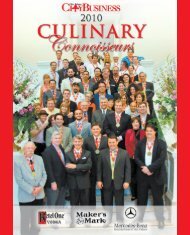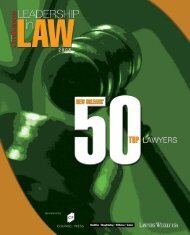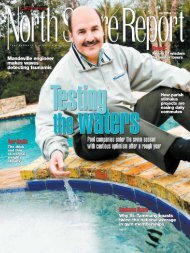We salute those who - New Orleans City Business
We salute those who - New Orleans City Business
We salute those who - New Orleans City Business
Create successful ePaper yourself
Turn your PDF publications into a flip-book with our unique Google optimized e-Paper software.
PHYSICIANSFrank DellaCrocePosition: co-founder, Center for Restorative Breast SurgeryAge: 42Family: wife, Janet; children, Hannah, 13, Nicolas, 10, Holley, 7Education: bachelor’s degree in pre-medicine, Northeast Louisiana University;doctor of medicine, Louisiana State University Health Sciences Centerphoto by Tracie Morris SchaeferScott SullivanPosition: co-founder, Center for Restorative Breast SurgeryAge: 44Family: wife, Michele Cooper; daughters, Alexis, 9, Elle, 5Education: bachelor’s degree in biomedical engineering, Tulane University;doctor of medicine, Louisiana State University Health Sciences CenterFrank DellaCroce, left,and Scott Sullivan.Drs. Frank DellaCroce and Scott Sullivan bring an individualappreciation for the aesthetic to their joint practiceat the Center for Restorative Breast Surgery.Sullivan’s distaste for the staid appearance of traditionaldoctors offices blends with DellaCroce’s appreciation ofwomen’s maternal qualities and natural anatomy, leading to aspa-like setting where patients enjoy aesthetically pleasingresults.“I still can’t stand going into a doctor’s office and it’s likea bus station. It’s so impersonal, sitting on chairs and everyonestaring at each other,” said Sullivan, <strong>who</strong> as a child battlingrecurring bronchitis dreaded physicians in white coatsand hospitals that smelled of rubbing alcohol.“I appreciate the artistry that is a woman’s body,”DellaCroce said. “To see that lost, harmed or hurt throughsurgical treatment, for me, is tragic.”The two bring years of innovation and experience to theirjoint practice dedicated to reconstructing the breasts ofwomen facing mastectomies in fighting cancer.They are noted for the sensitivity they display in preservingthe female form in the nipple-sparing mastectomy procedurethey pioneered, avoiding implants by using fat from thepatient’s body and leaving as little scarring as possible.Sullivan said they replace breast tissue with similar tissuefrom such parts of the body as the stomach, preserving a lifelikeresult and also considering the appearance of the sitefrom which tissue is taken.“It’s changing their life, retaining their femininity,” Sullivansaid. “What they are most afraid of is being deformed.”More than half their patients are from outside Louisianaand the United States.“It’s almost to the point that patients don’t want to leavethe doctor’s office,” Sullivan said. “<strong>We</strong>’ve had patients <strong>who</strong>,after going to the hotel (after recovery) decided to spend theday at the hospital.”•— Diana ChandlerPHYSICIANJoseph EppsPosition: neurosurgeon, Slidell Memorial HospitalAge: 67Family: wife, Shirley; daughters, Nikki, 34, Kelly, 30Education: bachelor’s degree in zoology, Howard University; doctor ofmedicine, Howard University College of MedicineFor Dr. Joseph Epps, a neurosurgeon at SlidellMemorial Hospital, medicine is a family tradition. Hisfather, Joseph, was a general surgeon, and his mother, Sara,was a social worker. While he became a doctor of medicine,his sister, Grace, earned her doctorate in medicaleducation.“My entire family was involved in the medical field,” saidEpps, <strong>who</strong> is the only neurosurgeon practicing full-time andtaking calls in Slidell Memorial Hospital’s emergency room.“I knew of nothing else.”Epps and his wife, Shirley, a registered nurse, maintain apractice in Slidell. Their daughter, Nikki, is an instructor ofanatomy and physiology at Colorado Technical University,while daughter Kelly will participate in a cardiology fellowshipat the University of Pennsylvania that starts in June.A native of <strong>New</strong> <strong>Orleans</strong>, Epps graduated from HowardUniversity in Washington, D.C., where he stayed for medicalschool, a residency in general surgery and a neurologyfellowship.When he returned to <strong>New</strong> <strong>Orleans</strong>, he set up his practice ineastern <strong>New</strong> <strong>Orleans</strong> and became the city’s first African-American neurosurgeon. Epps also was one of the first 10African-American neurosurgeons trained in the country.Throughout his career, Epps said his greatest accomplishmenthas been surviving and recovering from the aftermathof Hurricane Katrina, during which he lost his houseand practice. Through it all, though, Epps used his selfinventedelectronic medical record system that allowed himto forward displaced patients’ records to physicians throughoutthe country.Until the storm, he also acted as a clinical professor ofneurosurgery at Tulane University for nearly 30 years wherehe taught 20 residents about neurosurgery. Teaching othersabout medicine, he said, has been one of the most rewardingaspects of his career.“The interchange and education of <strong>those</strong> residents iswhat I feel most strongly about.”•— Amy Ferrara Smithphoto by Tracie Morris Schaefer22 Health Care Heroes



